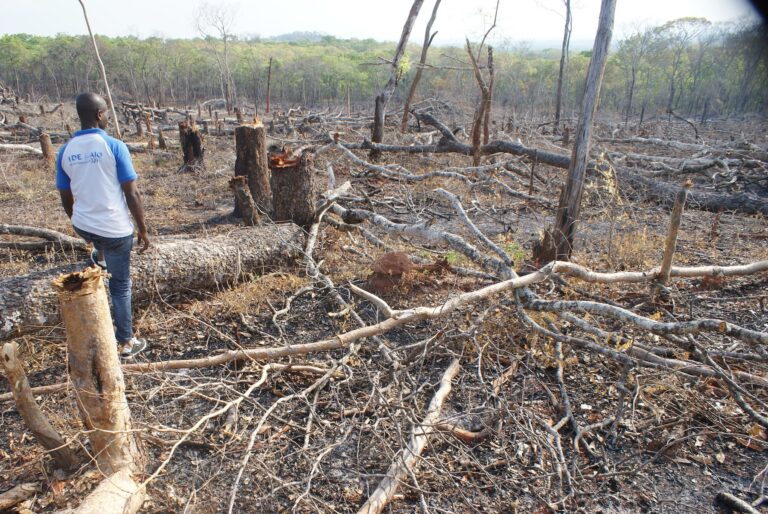By Trésor Daniel MEFIRE
Forests in Africa are disappearing at an alarming rate, threatening ecosystems, livelihoods, and the global climate. According to Trésor Daniel Mefire, author of The Devastating Impact of Deforestation in Africa and Cameroon, Africa loses approximately 3.4 million hectares of forest annually, with Cameroon alone accounting for 100,000 hectares of forest loss every year. The repercussions of this crisis are far-reaching, affecting biodiversity, food security, and even the availability of clean water.
The Driving Forces Behind Deforestation
Mefire identifies agricultural expansion as the leading cause of deforestation, responsible for 70% of forest loss in Africa and 52% in Cameroon. “Population growth and the increasing demand for arable land have driven millions of hectares of forest into farmland,” he states. Unsustainable farming techniques such as slash-and-burn agriculture further deplete soil fertility, reducing long-term agricultural productivity.
Logging is another major culprit, accounting for 20% of Africa’s deforestation and 38% in Cameroon. Illegal logging, particularly for high-value timber like mahogany, not only strips forests of their resources but also disrupts the lives of communities that depend on them. “The exploitation of forests for timber is not just an environmental issue; it is a social and economic crisis,” Mefire explains.
Poverty exacerbates deforestation, as many rural communities rely on forests for survival. “With limited economic alternatives, people resort to cutting down trees for firewood, farmland, and construction materials,” Mefire notes. This creates a vicious cycle in which deforestation leads to environmental degradation, further entrenching poverty.
The Consequences of Forest Loss
The impact of deforestation extends beyond the loss of trees. Mefire warns that deforestation significantly contributes to climate change. “In Africa, deforestation is responsible for 12% of greenhouse gas emissions, accelerating global warming and disrupting local weather patterns,” he states. Cameroon, in particular, experiences more extreme weather events such as droughts and floods due to forest loss.

Biodiversity is also under threat, with about 20% of Africa’s animal and plant species at risk of extinction. “In Cameroon, around 15% of species, including gorillas and elephants, are in danger,” Mefire reports. The loss of these species disrupts ecosystems and diminishes the potential for scientific discoveries.
Deforestation also affects agriculture, leading to soil degradation and reduced crop yields. “Africa loses approximately 30% of its agricultural productivity due to soil erosion caused by deforestation,” Mefire highlights. This food insecurity further exacerbates poverty and hunger in vulnerable communities.
Water scarcity is another critical consequence. Forests play a crucial role in maintaining groundwater levels and ensuring a steady supply of clean water. “About 25% of Africa’s population depends on forests for drinking water, with the figure rising to 40% in Cameroon,” Mefire warns. The destruction of forests jeopardizes access to this vital resource, threatening public health.
A Call for Action: Solutions to Combat Deforestation
Addressing deforestation requires urgent and sustainable solutions. Mefire advocates for promoting green jobs in ecotourism, agroforestry, and sustainable forest management. “Encouraging alternative livelihoods can reduce reliance on deforestation for survival,” he suggests.
Microfinance initiatives could also play a role in empowering communities. “Providing small loans to support sustainable businesses can help reduce pressure on forest resources,” Mefire states. Additionally, he emphasizes the importance of public and private investment in conservation efforts.
Another crucial strategy is strengthening law enforcement against illegal logging. “Enhancing collaboration between government agencies, local communities, and NGOs can help protect Africa’s forests,” Mefire urges. Implementing policies like Payments for Environmental Services (PES), which reward landowners for conserving forests, could also be a game-changer.
Deforestation in Africa is not just an environmental crisis; it is a socio-economic catastrophe that demands immediate intervention. As Mefire aptly concludes, “A collaborative, multi-sectoral approach is essential to saving our forests and securing a sustainable future for generations to come.” If swift action is not taken, Africa’s forests—and all they sustain—may soon become a thing of the past.
